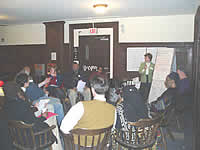|
How We
Use the Web:
III. Interactive Conversation (Forums)
Experiences from Serendip
- Public on-line class forums provide a space to speak
for students who might otherwise not speak, and so facilitate
class conversation.
 Public
on-line forums create a novel and useful conversational
environment for all students since they allow informal
exchange but also encourage some thinking before speaking. Public
on-line forums create a novel and useful conversational
environment for all students since they allow informal
exchange but also encourage some thinking before speaking.
- Public on-line forums encourage students to take their
thoughts seriously while at the same time remaining
open to revision.
- Public on-line forums contribute to making the student
more visible as teacher and the teacher more visible as
student.
- Public on-line forums make it possible to engage students
and faculty in discussions of issues that are of widespread
interest beyond the limits of the classroom.
- In this important sense, public on-line forums encourage
students to be teachers as well, not only in the classroom
but more broadly.
- Public on-line forums model and encourage development
of the kind of skills needed for effective exchange in
a pluralistic world.
Commentary on Serendip's Experiences
Public on-line forums can be used to facilitate an interactive
classroom environment but they also make available an opportunity
for a whole new perspective on the classroom. For the first
time, students and teachers can think of their activities
not only as meaningful to themselves but as significant contributions
to a larger process of developing understandings. On-line
forums can break down constraints of the classroom both temporally
and spatially. Conversations can continue outside of "class"
time and can contribute to and draw upon the thoughts of people
worldwide. Students (and teachers as well) can, in consequence,
come to think of their course activities not as simply "academic"
but as potentially playing a significant role in the world
community.
Serendip's Pedagogical Musings
The use of public on-line forums raises a number of issues
important in their own right and depends on a serious pedagogical
commitment from both students and teachers.
Both students and teachers need to be explicitly made aware
of the "public" nature of the work and some potential
consequences of that. In courses where "privileged" or "confidential"
materials are under discussion, participants need to be careful
about what is and is not said in a public on-line forum. In
all courses, participants need to recognize that things said
may be seen by anyone in the world and, once said, are recorded
and, in general, non-retractable. On the other hand, "ideas
in progress" are generally valuable to others and by making
the evanescent concrete, often to speakers as well. Moreover,
the need to be aware of and develop skills in deciding how
to speak in public spaces is not unique to the web but rather
one which, like the need to critically evaluate information,
is simply made more apparent by the web.
For successful on-line forums, in our experience, it is
not sufficient to simply make the forum available. One
needs to give the forum a significant role in the classroom
atmosphere as a whole. Among the absolute requirements
is that teachers need to be involved in forum activities.
This may involve postings by teachers in the forum
or the active use in class of comments made in the forum
by students. Frequently, on-line forums need also some direction
in terms of topics to be considered at any given time
and some efforts to synthesize or summarize thoughts
and move conversation in new directions. Forum participants
need not only a space to write, they also need to be encouraged
to listen, and to be provided some evidence that they are
being heard and are engaged in a activity productive to others
as well as themselves.
Teachers who are used to engaged, interactive classroom
conversations need to learn to transfer their understandings
into the forum environment. Those less familiar with such
classroom environments can make use of forums as a way to
develop their confidence in this realm.
|